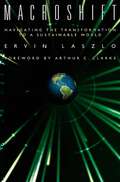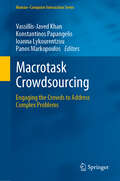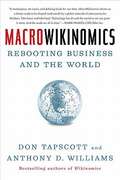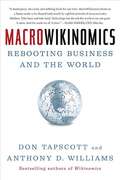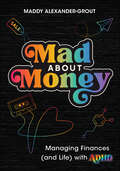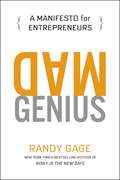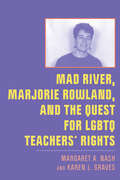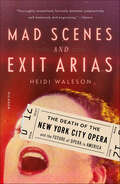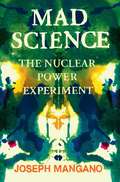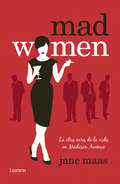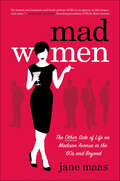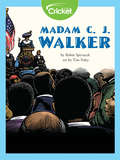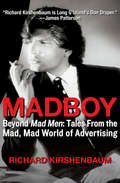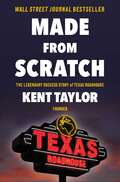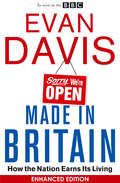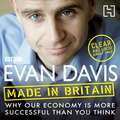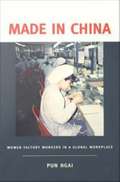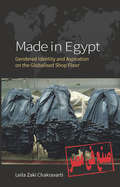- Table View
- List View
Macroshift: Navigating the Transformation to a Sustainable World
by Ervin LaszloWe live in the midst of one of the greatest technological revolutions in history, an era of deep-seated transformation-a macroshift in civilization, says preeminent scholar and futurist Ervin Laszlo. Its signs and manifestations are all around us, from the deadly HIV/AIDS epidemic sweeping Africa and the dangerous fire-trap sweatshops routinely killing workers in Bangladesh, to the environmental havoc created by genetic engineering, power plant pollution and mechanized agriculture. The application of new technologies has turned into a double-edged sword. The world is growing together in some respects, but is coming apart in others. Worldwide economic globalization, another sign of the macroshift, all too often benefits the few rather than the many. Hundreds of millions live at a higher material standard of living, but thousands of millions are pressed into abject poverty. The richest 20% earn ninety times the income of the poorest 20%, consume eleven times as much energy, and eat eleven times as much meat. There have been other macroshifts in human history, but they spanned centuries, allowing cultural values, beliefs, and change to occur gradually. Today, technology has reduced our time to adapt; the entire critical period of change is compressed into the lifetime of a generation. Today's macroshift, explains Laszlo, harbors great promise, as well as grave danger. He outlines two possible scenarios: "The Breakdown," where we choose to drift without a change in our current direction toward chaos, anarchy, and destruction, or "The Breakthrough," where we collectively transform our thinking and behavior to produce creative, sustainable solutions to dangerous global problems. And he shows what each of us can do-politically, professionally, and privately-to bring about the Breakthrough and shape a humane and sustainable global future. While technology is what drives the unprecedented speed of this macroshift, it is our vision, values, and actions now that will ultimately determine the outcome. The choice is up to us-the power is in our hands.
Macrotask Crowdsourcing: Engaging the Crowds to Address Complex Problems (Human–Computer Interaction Series)
by Panos Markopoulos Vassillis-Javed Khan Konstantinos Papangelis Ioanna LykourentzouCrowdsourcing is an emerging paradigm that promises to transform several domains: creative work, business work, cultural cooperation, etc. Crowdsourcing reflects the close-knit interplay between the latest computer technologies, the rapidly changing work model of the 21st century, and the very nature of people. The interplay makes for an exciting but at the same time challenging new field to investigate under the lens of a diverse set of disciplines, ranging from the technical to the social and from the theoretical to the applied. Early research has focused on an aspect of crowdsourcing known as micro-tasking. Micro-tasks are simple tasks (like image annotations) that anyone could perform. An emerging area is how to utilize crowdsourcing to solve problems that go beyond simple tasks towards more complex ones, that require collaboration and creativity. In juxtaposition to micro-task crowdsourcing, this book investigates macro-task crowdsourcing and its potential.
Macrowikinomics: New Solutions for a Connected Planet
by Don Tapscott Anthony D. WilliamsIn their bestseller Wikinomics, Don Tapscott and Anthony Williams showed the world how mass collaboration was changing the way businesses communicate, create value, and compete in the new global marketplace. This sequel shows that in more than a dozen fields-from finance to health care, science to education, the media to the environment-we have reached a historic turning point. Collaborative innovation is revolutionizing not only the way we work, but how we live, learn, create, govern, and care for one another. The wiki revolutions of the Arab Spring were only one example of how rebuilding civilization was not only possible but necessary. With vivid examples from diverse sectors, Macrowikinomics is a handbook for people everywhere seeking a transformation of industry and institutions by embracing a new set of guiding principles, including openness and interdependence. Tapscott and Williams argue that this new communications medium, like the printing press before it, is enabling nothing less than the birth of a new civilization. .
Macrowikinomics: Rebooting Business and the World
by Don Tapscott Anthony D. WilliamsIn their 2007 bestseller, Wikinomics Don Tapscott and Anthony Williams showed the world how mass collaboration was changing the way businesses communicate, create value, and compete in the new global marketplace. Now, in the wake of the global financial crisis, the principles of wikinomics have become more powerful than ever. Many of the institutions that have served us well for decades or centuries seem stuck in the past and unable to move forward. And yet, in every corner of the globe, a powerful new model of economic and social innovation is sweeping across all sectors--one where people with drive, passion, and expertise take advantage of new Web-based tools to get more involved in making the world more prosperous, just, and sustainable.
Macy's: Evolution in the Sunshine State
by Boris Groysberg Das Narayandas Sarah L. Abbott Benson P. ShapiroIn 2009, Lee O'Rourke was promoted to District Vice President in charge of Macy's newly created North Florida district. This district consisted of 11 stores located in the greater Orlando area and in the east coast towns of Daytona, Melbourne, Merritt Island, and Vero Beach. The performance of these stores had lagged in recent years, and O'Rourke was charged with building a cross-functional district team to support these stores and with improving their overall performance.
Mad About Money: Managing Finances (and Life) with ADHD
by Maddy Alexander-GroutMad About Money will help you to make sense of your life if you are neurodivergent or suspect you might be. Maddy, a 40 year old mum of two, has had her fair share of struggles with money, life and business without always understanding why. With her ADHD and Autism diagnosis, everything suddenly made more sense, and she has used her diagnosis to improve her life. Mad About Money: Managing finances (and life) with ADHD is not your typical money book, it is an unfiltered, honest, sweary and inspiring journey through the life of an undiagnosed neurodivergent woman. Award-winning writer and CPD-accredited neurodiversity specialist , money and business coach Maddy Alexander-Grout walks you through the story of her life. By sharing her own difficulties with money, spending, and debt, she shows you how to apply the lessons she learned in climbing back from over £40000 in consumer debt. But this book is not just about money, it's about the struggles she has had along the way as an undiagnosed neurodivergent with ADHD, Autism, Dyspraxia and more. This book will give you actionable tips to navigate life as a neurodivergent, manage your money, learn to understand your brain and make sense of your past, especially if you are, or suspect you, are neurodivergent. In the book: Applicable strategies for managing your money, parenting , mental health and starting a business as an undiagnosed neurodivergent Tips for managing your ADHD and other neurodivergent conditions Strategies for how to deal with a range of financial challenges—including debt and spending addictions—when you're neurodivergent An essential read for anyone who is neurodivergent or suspects they might be, especially if they have struggled with money and life up to now. Mad About Money is empowering, insightful and the perfect read for anyone who feels misunderstood in a world designed for neurotypical people.
Mad Genius
by Randy GageThis is a manifesto about ideas. Big ideas, small ideas, and outlandish ideas. Ideas that innovate, ideas that disrupt markets, and especially ideas that irritate. More than ideas, though, Mad Genius is about how ideas are born and the role they play in entrepreneurial thinking.This is a manifesto for managers who want to become leaders and leaders, who want to blow up mediocrity. Because whether you work in a traditional business, a nonprofit service organization, or in the public sector, the best way to create fresh and innovative solutions is to think like an entrepreneur.From the Hardcover edition.
Mad River, Marjorie Rowland, and the Quest for LGBTQ Teachers’ Rights (New Directions in the History of Education)
by Margaret A. Nash Karen L. GravesMad River, Marjorie Rowland, and the Quest for LGBTQ Teachers’ Rights addresses an important legal case that set the stage for today’s LGBTQ civil rights–a case that almost no one has heard of. Marjorie Rowland v. Mad River School District involves an Ohio guidance counselor fired in 1974 for being bisexual. Rowland’s case made it to the U.S. Supreme Court, but the justices declined to consider it. In a spectacular published dissent, Justice Brennan laid out arguments for why the First and Fourteenth Amendments apply to bisexuals, gays, and lesbians. That dissent has been the foundation for LGBTQ civil rights advances since. In the first in-depth treatment of this foundational legal case, authors Margaret A. Nash and Karen L. Graves tell the story of that case and of Marjorie Rowland, the pioneer who fought for employment rights for LGBTQ educators and who paid a heavy price for that fight. It brings the story of LGBTQ educators’ rights to the present, including commentary on Bostock v Clayton County, the 2020 Supreme Court case that struck down employment discrimination against LGBT workers.
Mad Scenes and Exit Arias: The Death of the New York City Opera and the Future of Opera in America
by Heidi WalesonFrom the Wall Street Journal’s opera critic, a history of how and why the New York City Opera went bankrupt—and what it means for the future of the arts.In October 2013, the arts world was rocked by the news that the New York City Opera—“the people’s opera”—had finally succumbed to financial hardship after 70 years in operation. The company had been a fixture on the national opera scene—as the populist antithesis of the grand Metropolitan Opera, a nurturing home for young American talent, and a place where new, lively ideas shook up a venerable art form. But NYCO’s demise represented more than the loss of a cherished organization: it was a harbinger of massive upheaval in the performing arts—and a warning about how cultural institutions would need to change in order to survive.Drawing on extensive research and reporting, Heidi Waleson, one of the foremost American opera critics, recounts the history of this scrappy company and reveals how, from the beginning, it precariously balanced an ambitious artistic program on fragile financial supports. Waleson also looks forward and considers some better-managed, more visionary opera companies that have taken City Opera’s lessons to heart.Above all, Mad Scenes and Exit Arias is a story of money, ego, changes in institutional identity, competing forces of populism and elitism, and the ongoing debate about the role of the arts in society. It serves as a detailed case study not only for an American arts organization, but also for the sustainability and management of nonprofit organizations across the country.“An intricate whodunit that seeks to find out who murdered the New York City Opera. . . . Waleson gives us a vivid description of each death-defying crisis and a sharp portrait of the ever-changing cast of would-be saviors who somehow always failed in their mission.” —The New York Times Book Review“Thoroughly researched, factually detailed, judgmentally well-balanced, and engrossing.” —Opera“Waleson’s in-depth study illustrates the challenges City Opera—and other opera houses—face in the 21st century as they seek to preserve tradition and innovate.” —Publishers Weekly“A thorough recounting of the tumultuous history of the New York City Opera [and] a cleareyed examination of the economic fragility of cultural institutions.” —Kirkus Reviews
Mad Science: The Nuclear Power Experiment
by Joseph ManganoWill Americans once again play nuclear roulette? Just one year after the Fukushima meltdown, all 54 reactors in Japan have been closed, and may never be restarted. Germany recently closed several reactors, and will shutter them all within a decade. Italy revoked its pledge to build new reactors, keeping that nation nuclear-free. All these decisions are based on the understanding that reactors are extremely dangerous and expensive. In the U. S. , the remnants of the once-overwhelmingly powerful nuclear lobby are making their last stand for "clean" nuclear energy. The sixty-year-old vision of power "too cheap to meter" (words originally uttered by a banker promoting the industry), is back. While other countries end their reliance on nuclear energy, Americans contemplate its revival, even as existing American reactors, which produce a fifth of U. S. electricity, pass retirement age and are corroding. In Mad Science, Joseph Mangano strips away the near-smothering layers of distortions and outright lies that permeate the massive propaganda campaigns on behalf of nuclear energy. He explores the history of the industry, with its origins in the Manhattan Project, through its heightening promotion during the Cold War and its entwinement with nuclear weapons. Mad Science includes an account of nuclear accidents and meltdowns and their consequences, from Chernobyl to Santa Susana and beyond; as well as a point-by-point refutation of pro-nuke arguments. Atomic energy is unsafe - it deals with staggeringly poisonous substances at every stage of its creation - un-economical in the extreme and impractical.
Mad Women
by Jane MaasPrimero el trabajo, luego el marido y después los niños: esas eran las reglas de Jane Maas cuando trabajaba como redactora en una agencia de Madison Avenue en los años sesenta, una época en que las mujeres con hijos eran franca minoría en estos cargos. Abrirse camino en una jungla poblada de caballeros con corbata no fue fácil para la joven Jane: las pocas mujeres publicistas se hacían cargo solo de cuentas pequeñas, percibían salarios menores, estaban sujetas a sufrir acoso sexual y no contaban con herramientas para defenderse más allá de su astucia y voluntad de triunfar.En Madison Avenue la creatividad, el sexo, el alcohol, el tabaco y las fiestas estaban a la orden del día, y Jane Maas evoca, con más humor que nostalgia esos días en que no existían los ordenadores, Internet y la telefonía móvil, cuando el papel carbón campaba a sus anchas y una señorita tenía que llevar guantes y saber sentarse en el taburete de un bar si quería conquistar el mundo.A través de anécdotas insólitas y divertidos chismorreos, Maas recorre su trayectoria profesional y revela cuánto hay de cierto -y de incierto- en la famosa serie de televisión Mad Men.¿Alguien quiere imaginarse paseando por las calles de Manhattan y trabajando al lado de Don Draper? Mad Women es su libro.«Devoré Mad Women de un bocado... y fue delicioso.»Jane Fonda
Mad Women: The Other Side of Life on Madison Avenue in the '60s and Beyond
by Jane MaasA New York copywriter reveals what it was like to be a woman in the 1960s male-dominated advertising world depicted in the hit show Mad Men.What was it like to be an advertising woman on Madison Avenue in the ‘60s and ‘70s—that Mad Men era of casual sex and professional serfdom? A real-life Peggy Olson reveals it all in this immensely entertaining and bittersweet memoir.Fans of the show are dying to know how accurate it is: was there really that much sex at the office? Were there really three-martini lunches? Were women really second-class citizens? Jane Maas says the answer to all three questions is unequivocally “yes.” Her book, based on her own experiences and on countless interviews with her peers, gives the full stories, from the junior account man whose wife almost left him when she found the copy of Screw magazine he’d used to find “a date” for a client, to the Ogilvy & Mather’s annual Boat Ride, a sex-and-booze filled orgy, from which it was said no virgin ever returned intact. Wickedly funny and full of juicy inside information, Mad Women also tackles some of the tougher issues of the era, such as unequal pay, rampant, jaw-dropping sexism, and the difficult choice many women faced between motherhood and their careers.
Madagascar: A Competitiveness and Exchange Rate Assessment
by Luc EyraudA report from the International Monetary Fund.
Madagascar: Recent Economic Developments and Selected Issues
by International Monetary FundThis report on Recent Economic Developments and Selected Issues was prepared by staff from the International Monetary Fund as background documentation for the periodic consultation with Madagascar. It covers production, income and prices, fiscal developments, monetary developments and structure of the financial sector, balance of payments and external debt, and structural reforms. Tables give economic and financial statistics.
Madagascar: Third Review Under the Poverty Reduction and Growth Facility--Staff Report; Staff Statement; and Press Release on the Executive Board Discussion
by International Monetary FundA report from the International Monetary Fund.
Madam C. J. Walker
by Robin SpevacekMadam C. J. Walker was born Sarah Breedlove in 1867 and rose from poverty to become one of the richest African American women of her time. Her determination to succeed never faltered, and she helped many people along the way.
Madame Prosecutor: Confrontations with Humanity's Worst Criminals and the Culture of Impunity
by Chuck Sudetic Carla Del PonteDel Ponte won international recognition as Switzerland's attorney general when she pursued cases against the Sicilian Mafia. In 1999, she become the chief prosecutor of the International Criminal Tribunal. She offers this courageous and startling memoir of her eight years spent striving to serve justice.
Madboy: Beyond Mad Men: Tales from the Mad, Mad World of Advertising
by Richard KirshenbaumA thrilling and irreverent memoir about the transformation of the advertising business from the 1980s to todayRichard Kirshenbaum was born to sell. Raised in a family of Long Island strivers, this future advertising titan was just a few years old when his grandfather first taught him that a Cadillac is more than a car, and that if you can&’t have a Trinitron you might as well not watch TV. He had no connections when he came to Madison Avenue, but he possessed an outrageous sense of humor that would make him a millionaire. In 1987, at the age of twenty-six, Richard put his savings on the line to launch his own agency with partner Jonathan Bond, and within a year, had transformed it from a no-name firm into the go-to house for cutting-edge work. Kirshenbaum and Bond pioneered guerilla marketing by purchasing ad space on fruit, spray-painting slogans on the sidewalk, and hiring actors to order the Hennessy martini in nightclubs. They were the bad boys of Madison Avenue—a firm where a skateboarding employee once bowled over an important client—but backed up their madness with results. Packed with business insight, marketing wisdom, and a cast of characters ranging from Princess Diana to Ed McMahon, this memoir is as bold, as breathtaking, and as delightful as Richard himself.
Made From Scratch: The Legendary Success Story of Texas Roadhouse
by Kent TaylorFrom founder Kent Taylor, the incredible made-from-scratch success story of Texas Roadhouse.In Made From Scratch, the late business maverick Kent Taylor tells the legendary story of Texas Roadhouse and in the process reveals its recipe for success: embracing unorthodox business practices. Because isn&’t it a little unusual for a company to do almost no advertising? Is it wild to give away free peanuts and rolls and keep prices low, even as costs rise, or to keep the menu basically the same since it opened? Does it fly in the face of reason to prohibit coats and ties at headquarters and to have a CEO who dressed like he was part of the landscaping crew? These business practices might be unconventional, but for Kent and Texas Roadhouse, they worked. What Kent and his Roadies cooked up is an island of misfits who are cool with being different. They love to have fun, but are serious about following meticulous recipes to serve up hand-cut steaks, fall-off-the-bone ribs, made-from-scratch sides, ice-cold beer, and irresistible fresh-baked bread. It&’s Legendary Food, Legendary Service, the Texas Roadhouse way. To show how this company became a staple of American dining and survived a once-in-a-lifetime pandemic, Kent took a trip back in time to offer the lessons learned from his pathbreaking life, revealing how a distracted kid from Louisville, Kentucky, created anything worthwhile at all.
Made In Britain: How the nation earns its living
by Evan DavisLooking at how Britain pays its way in the world today. Like Andrew Marr's HISTORY OF MODERN BRITAIN or Michael Palin's HIMALAYA, the book will have a coherence and life beyond the television series, mirroring its basic structure, but looking at some issues in greater depth, and telling additional stories to illustrate some of the ideas.This book is about the things that Britain produces in order to pay its way in the world, from physical goods that we can see and feel, to intangible services that are much harder to quantify. We don't have to be prejudiced in favour of certain types of value: we shouldn't assume finance is modern, and manufacturing out of date for example. What matters is what sells and for how much. From manufacturing to technology, design and the services industries, this book will provide a cutting edge analysis - via entertaining stories - about what we make and why it matters.
Made In Britain: How the nation earns its living
by Evan DavisWhat are countries famous for making? For Japan, the answer might be electronic goods. For Germany, automobiles. For France, perhaps a Louis Vuitton bag. But what about Britain?Here, Evan Davis sets himself the task of finding out. Offering a fascinating look at our manufacturing industries and revealing the various companies that might not be household names, but are very much world leaders in their fields, he shows how we have learnt to specialise in high end and niche areas that are the envy of the world. Taking in our disappointments and successes, Made in Britain is a brilliantly readable tour of our economic history, exploring the curious blend of resilience, innovation and economic free-thinking that makes us who we are.
Made In Britain: How the nation earns its living
by Evan DavisWhat are countries famous for making? For Japan, the answer might be electronic goods. For Germany, automobiles. For France, perhaps a Louis Vuitton bag. But what about Britain?Here, Evan Davis sets himself the task of finding out. Offering a fascinating look at our manufacturing industries and revealing the various companies that might not be household names, but are very much world leaders in their fields, he shows how we have learnt to specialise in high end and niche areas that are the envy of the world. Taking in our disappointments and successes, Made in Britain is a brilliantly readable tour of our economic history, exploring the curious blend of resilience, innovation and economic free-thinking that makes us who we are.
Made In Britain: How the nation earns its living
by Evan DavisLooking at how Britain pays its way in the world today. Like Andrew Marr's HISTORY OF MODERN BRITAIN or Michael Palin's HIMALAYA, the book will have a coherence and life beyond the television series, mirroring its basic structure, but looking at some issues in greater depth, and telling additional stories to illustrate some of the ideas.This book is about the things that Britain produces in order to pay its way in the world, from physical goods that we can see and feel, to intangible services that are much harder to quantify. We don't have to be prejudiced in favour of certain types of value: we shouldn't assume finance is modern, and manufacturing out of date for example. What matters is what sells and for how much. From manufacturing to technology, design and the services industries, this book will provide a cutting edge analysis - via entertaining stories - about what we make and why it matters.
Made In China: Women Factory Workers In a Global Workplace
by Pun NgaiAs China has evolved into an industrial powerhouse over the past two decades, a new class of workers has developed: the dagongmei, or working girls. The dagongmei are women in their late teens and early twenties who move from rural areas to urban centers to work in factories. Because of state laws dictating that those born in the countryside cannot permanently leave their villages, and familial pressure for young women to marry by their late twenties, the dagongmei are transient labor. They undertake physically exhausting work in urban factories for an average of four or five years before returning home. The young women are not coerced to work in the factories; they know about the twelve-hour shifts and the hardships of industrial labor. Yet they are still eager to leave home. Made in China is a compelling look at the lives of these women, workers caught between the competing demands of global capitalism, the socialist state, and the patriarchal family. Pun Ngai conducted ethnographic work at an electronics factory in southern China's Guangdong province, in the Shenzhen special economic zone where foreign-owned factories are proliferating. For eight months she slept in the employee dormitories and worked on the shop floor alongside the women whose lives she chronicles. Pun illuminates the workers' perspectives and experiences, describing the lure of consumer desire and especially the minutiae of factory life. She looks at acts of resistance and transgression in the workplace, positing that the chronic pains--such as backaches and headaches--that many of the women experience are as indicative of resistance to oppressive working conditions as they are of defeat. Pun suggests that a silent social revolution is underway in China and that these young migrant workers are its agents.
Made In Egypt: Gendered Identity and Aspiration on the Globalised Shop Floor
by Leila Zaki ChakravartiThis ground-breaking ethnography of an export-orientated garment assembly factory in Egypt examines the dynamic relationships between its managers - emergent Mubarak-bizniz (business) elites who are caught in an intensely competitive globalised supply chain - and the local daily-life realities of their young, educated, and mixed-gender labour force. Constructions of power and resistance, as well as individual aspirations and identities, are explored through articulations of class, gender and religion in both management discourses and shop floor practices. Leila Chakravarti's compelling study also moves beyond the confines of the factory, examining the interplay with the wider world around it.
